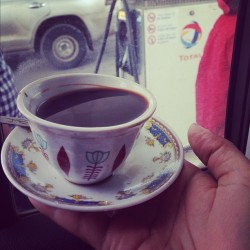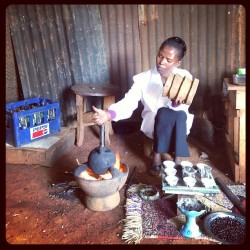The spirit of Ethiopian culture
Roxsanne Dyssell's second in a series of interviews with young artists and creatives: Next: creative director and photoblogger,Metasebia Yoseph

Metasebia Yoseph.
This is number two in our new weekly feature profiles blogs and or tumblrs curated by young Africans, on the continent as well as in the diaspora. The posts will highlight influences, genres, and point to the kinds of work being produced by young African photographers/curators. Most of those featured are at the start of their careers. We launched this feature last week with Batswana photographer Karabo Maine. We hope to introduce you to artists you either have not heard about or whose work does not saturate the mainstream (yet). This week’s post is co-authored with Genet Lakew. So here we go: Metasebia Yoseph, an Ethiopian-American curator and mixed media artist, is this week’s guest.
Metasebia is the founder and executive director of creative consulting company Muse Collective. Born and raised in Washington, D.C., she is currently in Ethiopia finalizing research for a coffee table book on the country’s enduring coffee traditions. The book is part of a transmedia project that includes a tumblr blog, appropriately titled A Culture of Coffee. Metasebia uses the blog as a space to share rich photographs of coffee, as it is harvested, roasted, grounded, brewed, and finally poured into small cups to savor with family, friends and neighbors in the spirit of Ethiopian culture. Through the blog and forthcoming book, Metasebia uses images, both her own and those produced by others, to delve into the stories of our daily cup of Joe.
Why coffee? How did you gravitate toward this specific cultural tradition? What kind of social significance does coffee have?
My background is in art history and now in my graduate program I specialize in communication, culture and technology. I’ve always focused my research on Ethiopian art and culture. For my first book project I was looking to highlight an Ethiopian cultural practice that would translate to a broader audience – coffee was the obvious choice. Coffee originated in Ethiopia and has become interwoven into the Ethiopian identity and everyday social experiences. The coffee ceremony here is also unique, with several variations throughout different regions and ethnicities in Ethiopia, making it an interesting study.
Do you personally take all of the photos that are on the blog? If not, where do you find them?
I wanted to incorporate technology and social media into the project and create a space for cross-cultural exchange through the Culture Of Coffee blog. I share aspects of the traditional Ethiopian Coffee ceremony and its legacy across the globe. I also encourage my audience to share their personal coffee experiences and cultural practices. Some of the images on the blog are those I have collected through my travels or come across in my research, while others have been submitted by fans and followers of the project.
How long have you been working on this project and where are you currently in the process?
I have been working on this project for 2 years. I am currently finalizing the research and compiling the content. I am also in the process of securing funding for publishing.
It seems you have started the 3-month journey to the coffee producing regions of Ethiopia. The photos are beautiful so far. Where have you been so far and what places do you have yet to visit?
So far, I have visited coffee farms and cafés in Borana, Yirgacheffe, Yirgalem, Sidamo, and Dire Diwa. I still hope to travel to Mekelle, Wollo, and Jimma before I return to DC. I selected these places because they are known for their coffee quality and distinctive coffee rituals.


How do you explain your project to the people you meet throughout Ethiopia? Do you have to imply that you’d like for them to make coffee or is it an automatic gesture?
Coffee is so much part of the Ethiopian social experience that I don’t really have to explain my presence in order to enjoy a cup or take part in a ceremony; it’s so readily available. However because it’s so ubiquitous, I do have to do more inquiry to get at the roots of the practices. I have been lucky enough to get institutional support from the Institute of Ethiopian Studies, and officials within the Ethiopian coffee sector, who have provided great guides and intermediaries.
Describe what it’s like to be a guest in someone’s home for a coffee ceremony in Ethiopia and in the U.S. What kind of sentiments does it stir? Are there any variations in the preparation/presentation?
The coffee ceremony that might be experienced in the US amongst the diaspora community is similar to the iconic version that most Ethiopians are familiar with. This is the slow-coffee experience where coffee is washed, roasted, ground, and brewed right in front of the guests. It is very sensory and aromatic, and often gives people time to converse and connect. Although there are some variations in the utensils used or the spices added to the brew to distinguish the taste of bunna between houses, the ceremony is essentially the same. However, the practice can vary dramatically in other regions in Ethiopia. For example, in Oromiya there is a ritual called Bunna Kalla (coffee slaughter), where whole coffee cherries are roasted and then re-fried in butter. The charred beans are then eaten to commence any major social event or gathering. Regardless of these ritualistic variations, I think anyone who partakes in these ceremonies is attempting to connect with something sacred.
What do you hope to stir in the hearts and minds of your blog followers?
My hope is to reconnect the larger coffee drinking audience back to the Ethiopian origins of coffee and celebrate the diverse ways that Ethiopians have come to celebrate and ritualize coffee. Centuries ago Ethiopia shared the coffee crop with the world, now its time to share in their Coffee culture.
Your blog also features photos of coffee cups from different cultures and countries. Speak on the universal nature of coffee.
I’m very fascinated with the evolution of coffee culture through out the world. Coffee has proliferated and taken root everywhere, and in turn every part of the world has developed its own relationship with coffee, as well as their own unique coffee traditions. I have tried to highlight those traditions through the blog and hopefully spread awareness of these varying practices.
What are the next steps for the blog and subsequent book?
My plan for the blog is for it to endure as a space for on-going cross-cultural exchange, long after the book is published. Books tend to be static and once published remain frozen, however the blog allows for the coffee experience to evolve along with the culture.
- Metasebia is currently in Addis Ababa, Ethiopia. Her website is here.



















